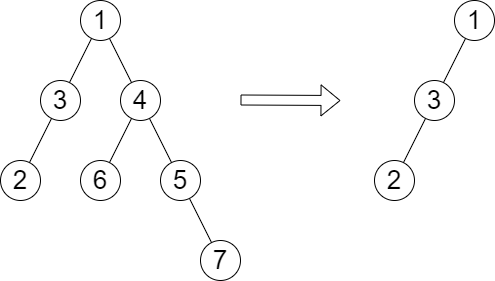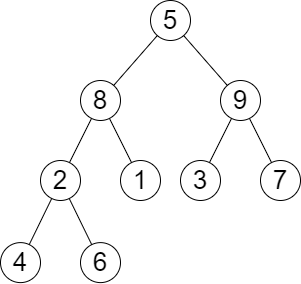You are given the root of a binary tree with n nodes. Each node is assigned a unique value from 1 to n. You are also given an array queries of size m.
You have to perform m independent queries on the tree where in the ith query you do the following:
- Remove the subtree rooted at the node with the value
queries[i]from the tree. It is guaranteed thatqueries[i]will not be equal to the value of the root.
Return an array answer of size m where answer[i] is the height of the tree after performing the ith query.
Note:
- The queries are independent, so the tree returns to its initial state after each query.
- The height of a tree is the number of edges in the longest simple path from the root to some node in the tree.
Example 1:

Input: root = [1,3,4,2,null,6,5,null,null,null,null,null,7], queries = [4] Output: [2] Explanation: The diagram above shows the tree after removing the subtree rooted at node with value 4. The height of the tree is 2 (The path 1 -> 3 -> 2).
Example 2:

Input: root = [5,8,9,2,1,3,7,4,6], queries = [3,2,4,8] Output: [3,2,3,2] Explanation: We have the following queries: - Removing the subtree rooted at node with value 3. The height of the tree becomes 3 (The path 5 -> 8 -> 2 -> 4). - Removing the subtree rooted at node with value 2. The height of the tree becomes 2 (The path 5 -> 8 -> 1). - Removing the subtree rooted at node with value 4. The height of the tree becomes 3 (The path 5 -> 8 -> 2 -> 6). - Removing the subtree rooted at node with value 8. The height of the tree becomes 2 (The path 5 -> 9 -> 3).
Constraints:
- The number of nodes in the tree is
n. 2 <= n <= 1051 <= Node.val <= n- All the values in the tree are unique.
m == queries.length1 <= m <= min(n, 104)1 <= queries[i] <= nqueries[i] != root.val
Approach 01:
-
C++
-
Python
class Solution {
public:
vector<int> treeQueries(TreeNode* root, vector<int>& queries) {
vector<int> result;
calculateHeights(root, 0, 0);
for (const int query : queries){
result.push_back(nodeToMaxHeight[query]);
}
return result;
}
private:
// nodeToMaxHeight[val] stores the maximum height of the tree without the
// node with `val`
unordered_map<int, int> nodeToMaxHeight;
// nodeToHeight[val] stores the height of the node with `val`
unordered_map<int, int> nodeToHeight;
// Helper function to calculate the height of a node
int getHeight(TreeNode* root) {
if (root == nullptr)
return 0;
if (const auto it = nodeToHeight.find(root->val);
it != nodeToHeight.cend())
return it->second;
return nodeToHeight[root->val] = (1 + max(getHeight(root->left), getHeight(root->right)));
}
// maxHeight: the maximum height excluding the current node `root`
void calculateHeights(TreeNode* root, int currentDepth, int maxHeight) {
if (root == nullptr)
return;
nodeToMaxHeight[root->val] = maxHeight;
calculateHeights(root->left, currentDepth + 1, max(maxHeight, currentDepth + getHeight(root->right)));
calculateHeights(root->right, currentDepth + 1, max(maxHeight, currentDepth + getHeight(root->left)));
}
};
class Solution:
def treeQueries(self, root: 'TreeNode', queries: list[int]) -> list[int]:
result = []
# Calculate heights for all nodes
self.calculateHeights(root, 0, 0)
# Retrieve the maximum height for each query
for query in queries:
result.append(self.nodeToMaxHeight[query])
return result
def __init__(self):
# nodeToMaxHeight[nodeValue] stores the maximum height excluding the node with `nodeValue`
self.nodeToMaxHeight = {}
# nodeToHeight[nodeValue] stores the height of the node with `nodeValue`
self.nodeToHeight = {}
# Helper function to get the height of a node
def getHeight(self, root: 'TreeNode') -> int:
if not root:
return 0
if root.val in self.nodeToHeight:
return self.nodeToHeight[root.val]
self.nodeToHeight[root.val] = 1 + max(self.getHeight(root.left), self.getHeight(root.right))
return self.nodeToHeight[root.val]
# Recursive function to calculate heights and update maxHeight without the current node
def calculateHeights(self, root: 'TreeNode', currentDepth: int, maxHeight: int):
if not root:
return
self.nodeToMaxHeight[root.val] = maxHeight
self.calculateHeights(root.left, currentDepth + 1, max(maxHeight, currentDepth + self.getHeight(root.right)))
self.calculateHeights(root.right, currentDepth + 1, max(maxHeight, currentDepth + self.getHeight(root.left)))
Time Complexity
- Calculating Heights:
The function
getHeightis called for each node of the tree to calculate its height. Each node is visited once, so the time complexity of this operation is \(O(n)\), wherenis the number of nodes in the tree. - Calculating Maximum Heights:
The function
calculateHeightsalso visits each node once to compute the maximum height excluding the current node. Since each node is visited once, this step also takes \(O(n)\) time. - Processing Queries:
For each query, retrieving the precomputed height from the
nodeToMaxHeightmap is an \(O(1)\) operation. If there are \(q\) queries, this step takes \(O(q)\). - Overall Time Complexity:
The total time complexity is \(O(n + q)\), where
nis the number of nodes in the tree, andqis the number of queries.
Space Complexity
- Space for Height Maps:
Two unordered maps,
nodeToMaxHeightandnodeToHeight, store values for each node. In the worst case, they each store \(n\) entries, leading to \(O(n)\) space usage. - Recursion Stack:
The depth of recursion depends on the height of the tree. In the worst case (unbalanced tree), the recursion stack can take up to \(O(n)\) space.
- Other Variables:
The result vector and query vector take \(O(q)\) space, where \(q\) is the number of queries.
- Overall Space Complexity:
The total space complexity is \(O(n + q)\), where
nis the number of nodes in the tree, andqis the number of queries.